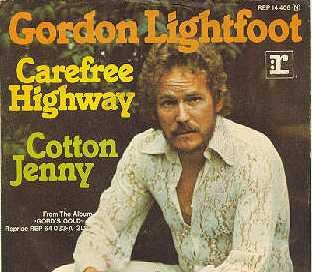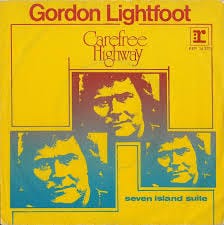"Carefree Highway" by GORDON LIGHTFOOT
Gordon Lightfoot died on May 1. His song about the romance of the road brings what's in the rearview mirror into poignant focus.
One of the songs to get Gordon Lightfoot noticed outside of the Toronto folk scene was the roguish “For Lovin’ Me.” The folk music boom loved a song about wandering. And country jukeboxes were always filled with honky-tonk cads. The song was covered by by Peter, Paul, and Mary, Ian and Silvia, and Chad and Jeremy before it even appeared on his 1966 solo album Lightfoot!, and it soon crossed over to country with versions by Johnny Cash, Waylon Jennings, and The Carter Family. And that’s a short list of artists who did the song. The lyrics brazenly spell out what you get for loving this particular troubadour: “Movin’ is my stock in trade… I won’t miss you when I’m gone.”
The highway is popular song’s reigning symbol for wanderlust, supplanting rail road’s long-held position sometime in the late ‘60s.1 By then, the open road was a romantic ideal for hippies, bikers, muscle car motorheads, and long haul truckers alike, and songs celebrating the adventures of each would all have their drive up the charts. For Gordon Lightfoot, 10 years after he recorded “For Lovin’ Me,” the highway more represented what all that wandering had left behind; it was carefree, but at a cost.
“Carefree Highway” was the second single from Lightfoot’s 1974 album Sundown, and it remains in the shadow of the title song, which gave the Canadian singer his #1 U.S. pop hit. (“Carefree Highway” reached #10 Pop, and like the titular single, it also chartered well on Adult Contemporary and Country, which is worth mentioning just to express how broad Lightfoot’s appeal was.) If “Sundown,” which features biting electric guitar, is where the 36 year old Lightfoot officially became a popstar, the acoustic “Carefree Highway” is him taking his folk-country roots along for the ride.
The song opens with seven-second intro of chiming acoustic guitars before his trilling baritone draws you into the first verse of just four lines. Lightfoot had an ear for concision, working for hours and hours on lyrics to trim away all but what mattered. These few hard-hitting lines are a remarkable bit of storytelling, casting the song in loneliness and regret.
Picking up the pieces of my sweet shattered dream
I wonder how the old folks are tonight
Her name was Ann and I'll be damned if I recall her face
She left me not knowing what to do
The lovely chorus comes crashing in just 30 seconds into this gentle midtempo tune. That’s good songcraft if you want to lodge a tune in people’s heads. It also has the effect of jarring the lyrics from the reverie of Ann, whose face can’t be remembered, to the present circumstance represented in the chorus — the need keep moving while enduring what sounds like a familiar hangover.
The morning after blues from my head down to my shoes
Carefree highway, let me slip away, slip away on you
Gordon Lightfoot once said that all his song lyrics are “a figment of the imagination; you just hope it rhymes.” But there was a real Ann whom Lightfoot knew as a young man, just as he had jotted down the words “Carefree Highway” he saw along Arizona’s Rte. 74. The song isn’t about that stretch of road north of Phoenix, and not even Ann, not really. It’s about how an ache he felt in his early 20s never left him, even if he had gone so far in the years since.
He didn’t know it when he wrote “For Lovin’ Me,” but all the movin’ on wouldn’t chase the memories of who and what he left behind. It’s why in later life, a sober Lightfoot came to hate that song. His maturity recognized its love ‘em-leave ‘em bravado as ridiculous and toxic, sure, but also he knew that the song wasn’t true, not in the way “Carefree Highway” is — no matter how far down the road you go, you take your pain and all that you’ve caused along with you.
15 Song Playlist
The hits are at the end.
Gord’s Gold
Gordon Lightfoot died Monday, May 1st at age 84. It was reported that among his last words were these to his manager, “We had a good run.”
In that run were big hits like “Sundown” and “The Wreck of the Edmund Fitzgerald,” and his first hit, “If You Could Read My Mind.” Each has its own story. The “hard-lovin’ woman” in “Sundown,” for example, was inspired by Cathy Smith, Lightfoot’s girlfriend of time, who later went on to some infamy, as she was the person who injected John Belushi with a fatal speedball of heroin and cocaine.
It may sound like an old legend from the “big lake the call Gitche Goome,” but the Edmund Fitzgerald was a ship that sank in Lake Superior in 1975. The story was fresh in Lightfoot’s mind while he and his band were cutting tracks for the Summertime Dream album. The song that went on to be a hit, reaching #2 on the U.S. pop charts. (For fun, play the song for someone who’s never heard it, preferably someone younger, and explain that this 7 minute dirgy song about a freighter that sank in one of the great lakes in the mid ‘70s was an actual bonafide pop hit. Then watch their facial expressions.)
Anyway, the version of “The Wreck of the Edmund Fitzgerald,” that went on to be played on pop radio wasn’t just a first take, but also the first time that he and his band had ever played it. That or any of these other songs wouldn’t have been hits if not for the girlfriend of the younger brother of a Warner Bros. Records promo guy. Lightfoot’s Sit Down Young Stranger album had stalled at 80,000 copies shipped. At a loss, the Warner Bros. exec told his brother and his girl to give it a listen; the brother returned and said, “she likes “If You Could Read My Mind.” The single made it to a Seattle DJ, who played it a lot, and from there, the song, and the album which was renamed If You Could Read My Mind at Lightfoot’s objection2, were foundational hits for him.
So maybe those are better songs to dive into to give Gordon Lightfoot his due, which from me was late in coming. “Carefree Highway” aged just a bit better, I think.
8 Song Playlist
Mark Stewart died last week at age 62.. The Pop Group and Stewart’s solo work pushed against the barricades of what art could be. It holds up well in these times, I think. This music — so much necessary, fractious noise — couldn’t be more different from the subject of this week’s newsletter, but I hope you give it a listen.
Thank You
Thanks to those of you who are new here. Welcome. Every time I get an email announcing a new subscriber, I read it with a bit of disbelief. As you can figure by juxtaposing Gordon Lightfoot with and artist like Mark Stewart, genre isn’t important here, just what music can make you feel.
Air travel is almost always associated with the loneliness of distance, not the romance. To quote Lightfoot’s “Early Morning Rain,” “You can't jump a jet plane like you can a freight train”
Lightfoot flew to L.A. from Toronto to express his umbrage at the title change. Famed Warner Bros. exec Lenny Waronker ask this: “Did you take algebra? Do you understand the difference between X and 7X?”





